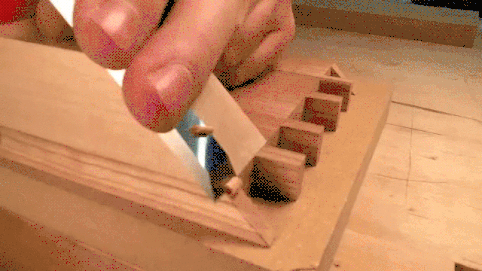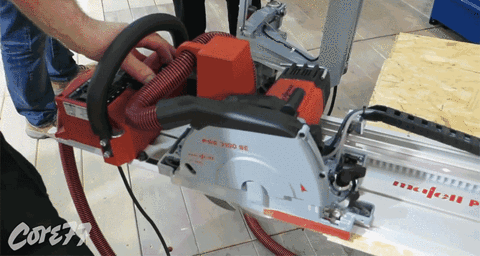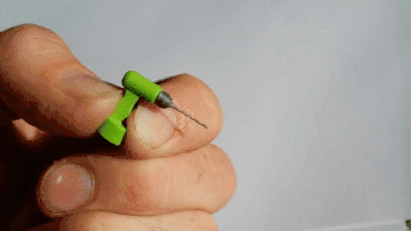How to series: Setting up a Woodworking Business #2 Tools and Machinery
Hello Fellow Woodworkers,
Just to re cap;
Over the coming weeks I will be doing a series of posts on the practical side of setting up shop.
This can apply to a hobby workshop but is mainly aimed at anyone who would like to set up a full time or part time business.
It is a big subject so I will do my best to divide it up into the following sections.
Workshop.
Tools and Machinery.
Finding a good timber yard.
Deciding what type of woodwork you are going to do.
Advertising and getting Customers.
Dealing with Customers.
Expanding your business.
I will add to this list and I would appreciate any suggestions.
I have experience in doing this myself from being self employed for 18 years.
If you missed the first instalment you can find it here;
https://steemit.com/woodworking/@jist/how-to-series-setting-up-a-woodworking-business-1-workshop
So lets get started with today's post,
#2 Tools and Machinery.
This is a juicy one so buckle up!
I have worked in various workshops and environments .
I have had the amazing opportunity and pleasure to work with some real old school Craftsmen over the years, some of which became Mentors.
I have also witnessed how not to do things.
Setting up a workshop and getting the tools that you want and need can take a lifetime of refinement.
This post will hopefully save you some time and money on your journey.
As always I will assume you are starting from nothing with no budget and build up from there.

The motto for this post is ' DO WHATEVER IT TAKES'.
From scratch,
Use what you can.
I have always believed that if you have enough perseverance you could re create Michelangelo's David with a pin!
Admittedly that would take a lot of effort and a long time but you see my point.
If you have zero tools ,budget and experience here are the options:
A basic tool set consists of a measuring tape, saw , chisel, hand plane and screwdriver.
You could make the rest if needs be.
Borrow from a family member of friend. This option is not the best but if needs must do it.
Ask around your local area. There may be a community workshop that lends tools. This is a great option to get you on your way.
I had a very distant ancestor who started a building empire with so little money he had to eye up other houses for level instead of using a spirit level!
Start small with the jobs and projects you take on. With each job you do a small amount of profit can and should be reinvested into better tools.
Always asking for a deposit before you start work can supply you with funds to buy the tools you need . ( more on this in a future post)
A great place to start is yard sales , car boot sales or your local classifieds. This is actually a business by itself because you can get great quality old tools for pennies. You will also start to learn about dealing and negotiating with people.
Ebay or a similar site. Be careful and do your research , some old hand tools can be collectors items which command a high price. It is not necessary to buy a named brand as most tools made from 'old steel' are 1000 times better than any new budget tools today.
Finding a mentor who will let you use their tools. As I have mentioned in post #1 many crafts people will gladly share their tools and knowledge with you if you are prepared to listen. Being able to pass on information is probably the best accolade a crafts person can have.
Rent a space in an established workshop and use their tools and machinery. This I what I did but I also bought my own tools as I built up the business. Better to be self reliant as soon as possible.
If you are in the position to buy all the tools you need choose wisely. There are many shiny new gadgets that will be a total waste of your money.
We have covered the basics now .
Always buy the best quality you can afford, but build slowly, If you need three clamps /cramps and you can only afford two good ones and a terrible 'make do' one do that! Whatever it takes to get the job done.
You will have frustrating times ,working harder than you should , with poor resources . This is all part of the leaning curve and it will test your mettle.
On to the good stuff.
Hand tools.

Basics are covered and you are proud of your well maintained tool kit.
As you progress you can add to your hand tools and you will also get a good idea of the tools you prefer to use. I really like old metal hand planes in various shapes and sizes. Some time a stanley side rebate plane is the only tool for the job.
Clamps and cramps. Another favourite of mine and in my opinion you can never have enough. The day will come when you wish you had an extra one. I always buy old one because of the quality. There can be the odd occasion when a joint isn't quite right and a strong clamp can soon sort it out.
Glueing up can be a stressful experience so be prepared. Also you can glue up multiple pieces at a time, kitchen doors or panels for example.
It goes without saying but always keep your tools in good condition.
There are lots of new power tools around and with new battery technology there is a lot of versatility. Depending on what machinery you have,if any, here are some must have power tools.
A good quality battery combi drill is top of the list.
I would say a router is a must. It is an all round tool which you will find invaluable. Start of with a basic cutter set and build up as and when a job requires.
Jigsaw. Another really useful tool which will speed up production time.
Circular saw. A staple part of any toolkit.
Biscuiter. The router will do this but for efficiency I advise a dedicated tool.
Belt sander. An absolute must. I have no idea how anyone can live without a belt sander.
There are many other useful tools out there , these are just the basics. If you have these you can make virtually anything.
Machinery.
I have used many machines in my time and I think the old cast iron ones win hands down every time. Solid, reliable, simple to fix in most cases and very affordable. Have a look on Ebay and in the classifieds to get an idea of price. Always research before you buy and ask to see it working.
Some great makes I have in my workshop are: Multico, Startrite, Dominion and Wadkin.
Saw bench. Ideally if budget allows you want a saw with a sliding cross cut table. The saw bench can be used for a whole range of processes and if I could only choose one piece of machinery it would be this.
Planer. In my workshop I have a Thicknesser and a separate surfacer/edger. This is purely to save time changing the dust extraction set up all the time. Any good solid planer/ thicknesser is fine and my number two choice. (Only because you can get a sawmill to plane up your timber if needs be).
Bandsaw. Can be used for loads of applications including deep ripping, curved work and jointing.
Mitre saw. I would definitely go for a new mitre saw from a good manufacturer for this one. A real time saver in the workshop and on site.
Morticer. Saves so much time and really accurate. By far the best option for mortices.
Tenoner. Luxury item but speeds up the jointing process massively.
Spindle moulder/ Router table. I personally do not like traditional spindle moulders , and opt for a well made router table setup . Spindle moulders are extremely versatile though and some craftsmen swear by them. A shop made router table can be very effective for most projects. I also have an overhead pin router which can be used for even more jobs.
Pad sander or drum sander. You can really get a good finish with a quality sanding machine. It will save hours of hard work with a belt sander on a big job.
Dust extraction. Health and safety first. Not only will good dust extraction save you from breathing in wood dust, it will also stop your machines getting clogged up.
Lathe. I do some wood turning but I am by no means an expert. I have a relatively new variable speed lathe which was not expensive and does the job. I would think that keeping to the 'old is better' rule here will stand you in good stead.
There are so many other machines which if I had the space I would have just for the sake of it, but these are the backbone of any woodworking workshop.
Always use safe practices and make sure you tools and machinery meet safety requirements.
So there we have it, I would love to hear your opinions.
The next post will be: #3 Finding a good timber yard.
These are just my humble opinions and you should always seek legal advice before setting up a business.
If you have any questions about woodwork, furniture or being self employed as a craftsperson let me know.
I know my wood and I have spent years teaching myself furniture making , furniture history as well as living it as a self employed cabinet maker .
Still I am learning every day and the journey is the point.
Many thanks for reading,
Until next time,
@jist
Gifs from www.giphy.com
Pictures from www.pixabay.com



Many thanks
Congratulations @jist, this post is the tenth most rewarded post (based on pending payouts) in the last 12 hours written by a User account holder (accounts that hold between 0.1 and 1.0 Mega Vests). The total number of posts by User account holders during this period was 1452 and the total pending payments to posts in this category was $2589.97. To see the full list of highest paid posts across all accounts categories, click here.
If you do not wish to receive these messages in future, please reply stop to this comment.
Wow, Thanks
Seems like some rich people from above really like your post.
If that continues the woodworking Tag will be yours to dominate ;)
Thanks. I can't believe how much attention this post got.
You have collected your daily Power Up! This post received an upvote worth of 0.79$.

Learn how to Power Up Smart here!
This post has received a 1.46 % upvote from @buildawhale thanks to: @fat-elvis. Send at least 0.50 SBD to @buildawhale with a post link in the memo field for a portion of the next vote.
To support our daily curation initiative, please vote on my owner, @themarkymark, as a Steem Witness
Thanks @fat-elvis
Great rundown. Looking forward to the next post.
Good one.. keep upvoting and commenting my post.. I will do same..daily
Thanks
Wow, this is what my uncle does but I never knew anything about it, but you post has made me an expert already. Well done
Thank you, I am please my post has given you some insight.
Another quality post, I'm curious as to what type of work you take on in your workshop? Do you have your machines set up in a specific way to save time? Do you follow LEAM methodology?
Great stuff!
Hi, I take on a wide range. Joinery when I have to pay the bills but I generally get to pick and choose. I mainly do bespoke one off pieces. Traditional, contemporary, fitted or freestanding as well as restoration. I have set my shop up the way I like it but change things according to the task at hand. Efficiency makes a lot of difference. Thanks
Very good, and look what your post is worth! good job buddy!
Thanks Man